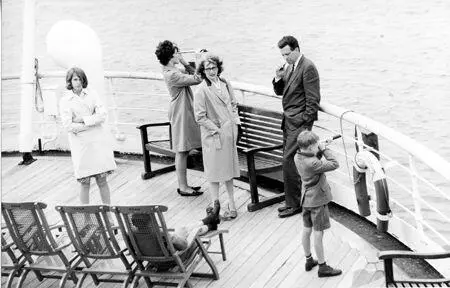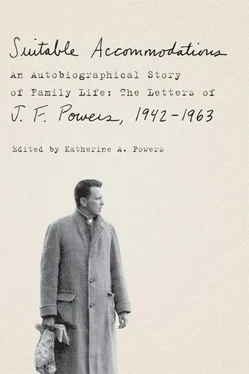I have decided on the first word of my new novel. It is “I” and now for the second one. […] Anon.
Jim
Jim’s hope that Morte D’Urban would bring financial salvation and a place to live was finally extinguished. The novel sold only twenty-five thousand copies in hardcover, and so, he wrote, “the great experiment with the great American (and British) reading public is over, so far as I am concerned.”
JACK CONROY
412 First Avenue South
St Cloud, Minnesota
August 29, 1963
Dear Jack,
[…] We are hauling ass for Ireland soon. I am apprehensive, but that is the only place that lights up at all on the map, if only dimly. […] I am trying to get into a new novel, nonclerical, but not doing so well at the moment, what with all the commotion of packing and disposing (again) of worldly goods. In the words of Lead Belly, I am, like the boll weevil, lookin’ for a home. We have here below no lasting home, we all know, but in my case there seems no margin for error to build on. I keep having to get rid of furniture and sets of books that were going to adorn my estate after which the collected edition of my works was going to be named, but perhaps it’s just as well. We sail from New York on September 13, on the Nieuw Amsterdam . Anon, then, Jack.
Jim
28. Ireland grey and grey and grey, then seen closer, green, green, green, September 23, 1963–Christmas 1963

Sailing to Ireland aboard the Nieuw Amsterdam, September 1963
The Powers family traveled to New York by train and sailed on the Holland America Line’s Nieuw Amsterdam (“easy voyage and bad food”), arriving in Ireland on September 19. From the United States, they had arranged to stay in the Trenarren Hotel in Greystones as paying guests for the rest of the month. After that, the proprietors were moving to England for four months, during which the Powers family would have sole occupancy. That was the plan, but it was not how it worked out in the end. It became a dismal affair.
DOYLES, O’CONNELLS, PALMQUISTS, PETTERSES
Trenarren Hotel
Greystones, County Wicklow
Ireland
September 23, 1963
Dear All,
[…] Let me say at the outset that nothing has been gained so far and nothing lost. I do not find myself any clearer in mind than I was a month ago. The trip, as regards weather and children, was better in the first and about what I expected in the second. Arriving in St Paul, we went to the St Paul Hotel, got the children to bed — all of us in one big room, with two bathrooms — and Betty and I went down for a drink in the Gopher Grill, Carlsberg beer, and then back to the room, where the ten o’clock news was coming on. I began to watch Channel 4 for what I thought just might be the last time when Fr Egan showed up. He regaled us all until the children dropped off, and then I took him to his car, which, a Mercedes diesel, I am to inherit on his death.
The trip down the river the next morning on the Builder1 was beautiful in a way I’ve seldom seen in the Middle West: raining slightly, with fog hanging over the river and in notches in the little mountainous hills, with grey herons set out like lawn furniture at suitable intervals, literally hundreds of them. Chicago was humid and eightyish and no place to shop for salami, cheese, pickles, bread, beer, and canned soft drinks, with only an hour to do it in, which was what I did, but fortunately I know my way around the Loop and have plenty of money for cabs. This stuff we ate and drank in our compartments so we didn’t have to appear en masse in the diner on the 20th Century.2 (By now you will have noticed that we were following in the footsteps of Fr Urban, from Builder to Century.)
New York was also humid and eightyish the next morning. We were compelled by our numbers to take two cabs to our hotel. We then quarreled for a while, the whole family, and some of us took baths, and some went out to see the Empire State Bldg, I leading this group and, one thing leading to another, actually going up and paying money to do so and glimpsing the Nieuw Amsterdam at her berth in the distance. I returned and called various people in publishing and show business such as Al Jolson and soon, as luck would have it, was out on the streets again leading the same group as before (Jane, Hugh, Boz) from Schrafft’s for sodas to Hoffritz’s for a brass compass to Gimbels for a very good buy in lead soldiers and a paddle and ball, all of which we needed, with our baggage, like yet another hole in the head. But as you might guess, I was fighting for my life by this time.
That evening we dined and wined at Robt Lowell’s apartment, and the next morning he saw us off at the boat. The ship sailed easily except late on the first day and once or twice for short intervals, but the food was a large disappointment to all and particularly to Fatso, who had been looking forward to a gastronomic bash. In the end, she consoled herself with innumerable Holland gins at ten cents a throw and little Dutch cigars. I spent hours on the deck in my chair and blanket and wondered at the meaning of life aboard ship. Everywhere I looked I saw Hedi and Bruno living it up and, having traveled on American, German, and British vessels before, thought there was really no way to escape the sight of same. One man and his wife were particularly hard to stomach: he was handsomely grey with a sabre scar on his left cheek, à la Heidelberg, and she was long-legged (in yellow slacks) and leathery of visage, and when separated by other acquaintances they were busily striking up in all directions would call and wave and smile to each other sweetly from time to time. “Blow it out!” I’d say to myself from time to time, resorting to this nautical term, although the navy was not my branch of the service.
We saw The Leopard in the cinema aboard and enjoyed it more for the scenery and for what it might have been than what it was. The last night, as we approached Ireland, there was fog, and consequently thoughts of immortality. The name Nieuw Amsterdam struck me as just right for a sea disaster, doubtless because of Hopkins’s poem about the wreck of the Deutschland or something. Ireland grey and grey and grey and then seen closer, green, green, green: the same old tender coming out to meet us, the same old fat man employed by American Express, and the wonderful consideration shown by porters and customs men and baggage men, as always, which is why, when you travel in the other direction, you are almost killed by New York.
Train to Cork (from Cobh), from Cork to Dublin, and on to Dun Laoghaire, and then by cab (“You must have a very big trunk — boot, that is — to get all that luggage stored away”—“Vauxhall has a very big boot, sir”) to the Trenarren Hotel in Greystones. It is not, we saw right away, the hotel we had in mind. It is dumpy in its furnishings but excellent in its cuisine, miraculously so, and we’ll be all right, I guess, for the next four months. The boys went to school today, Christian Brothers, and seemed to fare very well, and this I regard as a blessing from God, as I feared this aspect of our trip as much as any. We had tea with the O’Faolains this afternoon. They say we could buy a house with only a little down, but, though this is news to me, I don’t know. I have been so busy cursing Doubleday and the American reading public for not giving me a bestseller that the idea of lighting a candle is strange to me. Now I’ll close with gratitude to you all — for your various favors, especially the ladies.
Jim
FRED AND ROMY PETTERS
Читать дальше













